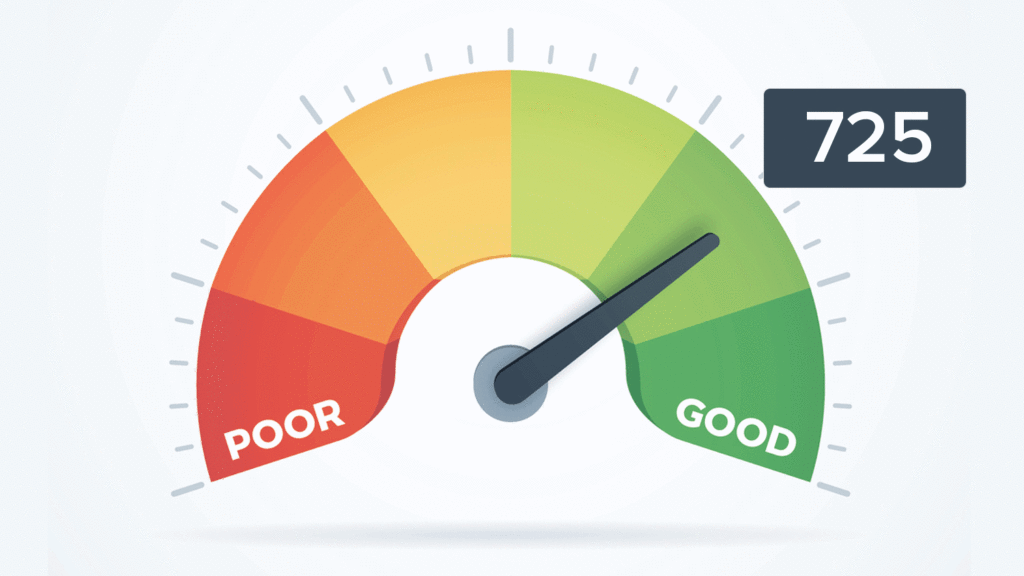When it comes to your money, your credit score is one little number that says a lot about not only your past credit history, but also what’s to come when and if you want to borrow money in the future. What is a good credit score, exactly, though? Read on to find out!

What is a Credit Score?
Your credit score is three-digit number between 300 and 850 assigned to you by the major credit bureaus that can help lenders get an idea of how credit-worthy you are, meaning essentially that it’s a numerical value that measures how likely (or unlikely) you are to pay back money you owe to lenders. Credit scores are used by almost all major lenders to decide who is worthy of a loan or line of credit and who isn’t.
How is Your Credit Score Calculated?
Your credit score is calculated based on several factors, including:
- Payment history (were all payments made on time?)
- Length of credit history
- How many accounts you have open
- Types of accounts you have open
- How much available revolving credit you have
FICO® Score vs Credit Score
FICO® and VantageScore® are arguably the two most dominating companies in the credit scoring industry. They both develop credit scores for customers while using slightly different scoring processes. FICO® Created by the Fair Isaac Corporation, FICO® scores are used by more than 90% of top lenders. The company was created in 1989 and its scoring models have modernized and improved since. In addition to traditional credit scores, FICO® provides industry-specific scoring models for specific credit products, such as mortgages and auto loans.
Some credit card companies allow you to seek out your FICO® score for free from one of the three major credit bureaus – TransUnion, Equifax, and Experian. A few credit card issuers who give cardholders access to their free FICO® score include American Express®, Citibank®, and Bank of America®.
VantageScore®
VantageScore® was developed in 2006 through a joint venture of TransUnion, Equifax, and Experian. While not as popular as FICO®, credit scores by VantageScore® are also commonly used by lenders. The VantageScore® model slightly differs from that of FICO®, even though both companies aim to curate the same thing: a credit score. It’s important to note that the VantageScore® model uses a lot of the same factors that are used when computing FICO® scores, but VantageScore® can give more weight towards certain factors.
On Credit Karma, you can check your VantageScore® for free, as well as observe various credit factors that may affect your score. A few credit card companies that issue free VantageScore® credit scores for cardholders are USAA® Bank and Chase Bank.
What is a Good Credit Score?
This is a somewhat subjective question depending on the lender asking about your credit score and which credit bureau is reporting the score, but generally speaking, a good credit score falls between 670 and 799. A score in that range or higher is generally a good indicator to lenders that you will pay back money that you borrow from them.
Here is a breakdown of the various credit score ranges specific to FICO® and VantageScore®.
FICO®:
Very Poor: 300-579
Fair: 580-669
Good: 670-739
Very Good: 740-799
Exceptional: 800-850
VantageScore®:
Very Poor: 300-579
Poor: 580-669
Fair: 670-739
Good: 740-799
Excellent: 800-850
As you can see, both credit score companies have slightly different numerical interpretations for what is considered to be a “good” credit score. While FICO® perceives a credit score of 670-739 as good, VantageScore® identifies a credit score of 740-799 as good. It can be a smart idea to compare your credit score from one company to another to get more perspective on where you stand with your credit.
Does Your Credit Score Really Matter?
The simple answer is that if you intend to borrow money at any point, then yes, your credit score is important. Be sure you check your score frequently to catch any inaccuracies and watch how changes in your credit report affect your score. Aside from the intention to borrow money, having a good credit score is beneficial for other reasons, too.
Your credit score can have an impact on your insurance premiums, meaning that a higher score could equate to you paying much less every month for your health insurance. In the long run, an improvement in your creditworthiness means you’d be saving money.
Nowadays, many Internet, TV, and cell phone providers check your credit before committing to provide you with their service by setting you up with an account. So, having a good credit score increases your chances of waiving security deposits when you sign up for Internet or cable, ultimately helping you qualify for optimized terms and deals.
In general, a good credit score is essential for maximizing your financial credibility. Having access to better financial deals isn’t something anyone should pass on. Check your score below.